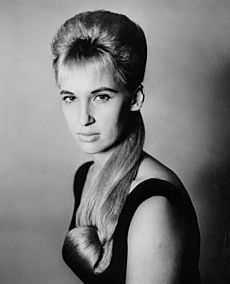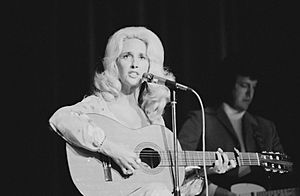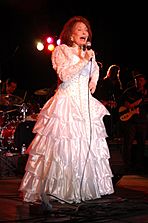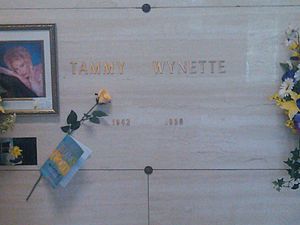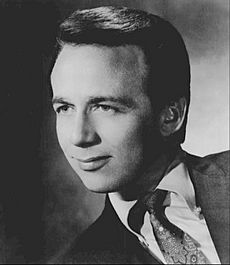Tammy Wynette facts for kids
Quick facts for kids
Tammy Wynette
|
|
|---|---|

Wynette on the set of The Johnny Cash Show in 1971
|
|
| Born |
Virginia Wynette Pugh
May 5, 1942 |
| Died | April 6, 1998 (aged 55) Nashville, Tennessee, U.S.
|
| Resting place | Woodlawn Memorial Park Cemetery |
| Occupation |
|
| Years active | 1965–1998 |
| Spouse(s) |
|
| Children | 4 |
| Musical career | |
| Genres | |
| Instruments |
|
| Labels | |
Tammy Wynette (born Virginia Wynette Pugh; May 5, 1942 – April 6, 1998) was an American country music artist, as well as an actress and author. She is considered among the genre's most influential and successful artists. Along with Loretta Lynn, Wynette helped bring a woman's perspective to the male-dominated country music field that helped other women find representation in the genre. Her characteristic vocal delivery has been acclaimed by critics, journalists and writers for conveying unique emotion. Twenty of her singles topped the Billboard country chart during her career. Her signature song "Stand by Your Man" received both acclaim and criticism for its portrayal of women's loyalty towards their husbands.
Wynette was born and raised in Tremont, a small town in Itawamba County, Mississippi, by her mother, stepfather, and maternal grandparents. During childhood, Wynette picked cotton on her family's farm but also had aspirations of becoming a singer. She performed music through her teen years and married Euple Byrd at age 17. With several marital setbacks, Wynette enrolled in cosmetology school and later appeared on a local country music television program. Wynette then divorced and moved to Nashville, Tennessee, to pursue a country music career in 1965. She soon met her second husband, Don Chapel, and eventually signed with Epic Records. Under the production of Billy Sherrill, her first single was released in 1966 called "Apartment No. 9". In 1967, she had her first commercial success with the single "Your Good Girl's Gonna Go Bad". In the late sixties, Wynette's career rose further with the number one Billboard country singles "I Don't Wanna Play House", "D-I-V-O-R-C-E" and the self-penned "Stand by Your Man".
As her career entered the 1970s, Wynette was among country music's most popular artists and regularly topped the charts. During the same time, she met and married fellow country artist George Jones. The pair had a recording career together that resulted in several number one country singles and a successful touring act. However, their relationship was tumultuous and they divorced in 1975. Wynette returned as a headlining solo performer following their separation. She also continued to have singles regularly make the upper reaches of the country charts into the 1980s. During this time, she also acted on several television shows, including Capitol (1986). Wynette had several more high-profile relationships before marrying her final husband, George Richey, in 1978.
Wynette has sold an estimated 30 million records worldwide. She has received two Grammy Awards, three Country Music Association awards, and two Academy of Country Music Awards. Wynette was also among country music's first female performers to have discs certify gold and platinum by the Recording Industry Association of America. Her influence as a country music artist led to several inductions into music associations. This includes inductions into the Country Music Hall of Fame and the Nashville Songwriters Hall of Fame.
Contents
Early years
Virginia Wynette Pugh was born in Itawamba County, Mississippi in 1942. With only 800 people, Itawamba County did not have any official towns at the time of her birth. The farm where she was born bordered the Alabama state line. Wynette later credited both Alabama and Mississippi as her home states. She was the only child born to Mildred Faye Russell and William Hollis Pugh. Russell was a school teacher, while her father was an aspiring musician who played guitar and sang in a group. Her father was diagnosed with an inoperable brain tumor and died when Wynette was only nine months old. Weeks before his death, Wynette's father brought her to the family piano and insisted she learn to play when she became old enough. Following his death, Wynette's mother moved to Memphis, Tennessee, where she worked in a defense plant during World War II. She was left in the care of her grandparents and picked cotton on their Mississippi farm. "I hated every minute I spent picking cotton," she recalled. Her mother's sister Carolyn was raised alongside Wynette and they developed a sister-like bond. She also learned to play the musical instruments that her father left behind.
Wynette referred to her grandparents as "Mama" and "Daddy" while Mildred Russell was simply referred to as "Mother". Most people referred to young Virginia Pugh by her middle name, "Wynette". In 1946, Mildred Russell married Wynette's stepfather, Foy Lee. As a child, Wynette played basketball but was not allowed to wear the shorts provided to the girl's team. Instead, her grandfather had Wynette wear blue jeans. She later made the all-state basketball team in both 1958 and 1959. She also took piano lessons and learned to play by ear. After several lessons, the instructor told her mother she was "wasting her money" because of her natural ability on the instrument. In upper elementary school, Wynette befriended classmate Linda Cayson. The pair became close friends and later realized they could harmonize with one another. Along with another friend, they would form a trio called Wynette, Linda & Imogene. The trio often sang at gospel functions together. A local Methodist minister had both Linda and Wynette sing on his early-morning Saturday radio show on WERH. They also listened to music together, including country artists Ernest Tubb and Hank Williams.
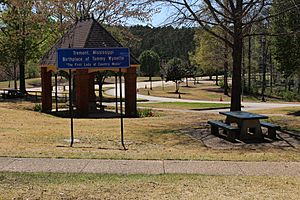
Wynette attended Tremont High School in Tremont, Mississippi. She was considered to be "popular" by high school friends. In 1960, she was voted "Miss Tremont High School" by her classmates. Wynette also smoked cigarettes. She also became fascinated with the opposite sex. "She was into datin' and boys long before we were," recalled friend Holly Ford. However, mother Mildred disapproved of her daughter dating and the pair often argued about it during her teenage years. During this period, Wynette fell in love with fellow church attendee, Billy Cole. Wynette insisted on getting married to Cole and attempted to keep it from her mother by mail-ordering eight dollar rings to her high school. However, Wynette's mother discovered her daughter's idea and stopped the courtship. Wynette temporarily moved to Birmingham, Alabama, when she was 17, where her mother and Foy Lee were living at the time. She soon moved back to her grandparents' farm after her mother found her difficult to control.
At age 17, she married Euple Byrd, which caused friction with Wynette's mother. The couple lived temporarily at Euple's family home and then in a small apartment in Tupelo, Mississippi. By this point, Wynette had become pregnant with her first child and was given the opportunity to live rent-free at a home owned by her grandfather. Built in 1844, the home had no running water, heat, or electricity. Friend Linda Cayson helped Wynette nail cardboard boxes to the walls to keep the wind out during the winter months.
In 1963, Euple obtained a job in Red Bay, Alabama, that allowed the family to move to a home with more amenities. To help sustain themselves financially, Wynette convinced her mother to help pay for her to attend Mrs. McGuire's School of Beauty. In the middle of her schooling, Euple found work in Memphis, Tennessee and the young family moved there. In Memphis, she obtained a job as a barmaid and sang for customers. Both the bar owner and the building's in-house pianist were impressed by Wynette's talents and encouraged a move to Nashville, Tennessee. However, the family soon returned to Tupelo where she finished cosmetology school. After becoming famous, she continued renewing her cosmetology license every year for the rest of her life, in case she ever had to go back to a daily job. Wynette ultimately left her first marriage and moved to Birmingham, Alabama.
Career
1964–1966: Early career in Alabama and the move to Nashville
Wynette moved to Birmingham in 1964 and lived with her paternal grandparents, uncle, and cousins. She discovered that her cosmetology license wouldn’t transfer to Alabama, so she enrolled at a beauty college. Her paternal family also encouraged Wynette's musical talents. Her uncle worked for the WBRC television station in Birmingham and helped his niece secure an audition for the Country Boy Eddie country music television show. The show's headliner, Eddie Burns, was impressed and agreed to have her on the program. On her first show, she sang a cover of Patsy Cline's "Sweet Dreams" while the camera pointed above her waist to avoid showing Wynette's pregnant body. Wynette performed on the program from six to eight o'clock each morning before going to school, then went to work at the Midfield Beauty Salon. She received 45 dollars per week. She befriended the show's pianist, David Vest, who helped record demos. The pair often performed together, playing piano bars in the Birmingham area.
Wynette started visiting a local radio station called WYAM and met disc jockey Fred Lehner. She accompanied Lehner on a trip to Nashville, Tennessee, which inspired her to pursue a country music career. Meanwhile, Euple Byrd continued returning to Birmingham. Not officially divorced, the couple agreed to give their marriage one final chance and they lived in a Birmingham housing project near the steel industry. Byrd secured a new job but did not return to their residence, according to Wynette. She decided to make the move to Nashville in January 1966 with her three children and all their belongings in their car.
After she arrived in Nashville Wynette moved into the Anchor Motel while she attempted to secure a recording contract. She met her future husband, musician Don Chapel, at the motel. They eventually moved into an East Nashville apartment and put together a road show. For several months the pair performed in several states, including Georgia and Pennsylvania. Chapel attempted to help Wynette secure a country recording contract with the Musicor, Hickory, Kapp, and Decca labels, but Wynette was turned down by every company. Nashville producer Kelso Herston helped her arrange a meeting with new Epic Records producer Billy Sherrill. Wynette went into Sherrill's office and pitched him several songs. Sherrill was impressed by her voice and signed her to a recording contract with Epic in 1966.
On her first recording session, Wynette cut Bobby Austin's "Apartment No. 9". At that point Sherrill changed her stage name from Wynette Byrd to Tammy Wynette. "You look like a Tammy to Me," Sherrill told her in reference to the film Tammy and the Bachelor. "Apartment No. 9" was released as Wynette's debut single and reached number 44 on the American Billboard Hot Country Songs chart. Although she had a charting single, Wynette still had little income. Sherrill arranged for booking agent Hubert Long to set up tour dates for her. Most promoters did not want to book Wynette because she was a female performer. "I had begun to realize I was working in a man's world, and most of them looked down on women in the business," she later explained.
1967–1975: Breakthrough, "Stand by Your Man" and recordings with George Jones
In 1967, Epic released "Your Good Girl's Gonna Go Bad". It climbed to number three on the Billboard country singles chart and was Wynette's first chart success. Her debut album of the same name was also released in 1967 and reached number seven on the Billboard Country LPs chart. They were followed by a duet with David Houston called "My Elusive Dreams", which was her first number one country single. Its follow-up was the solo single "I Don't Wanna Play House" which topped the Billboard country chart in 1967. It later won Wynette the Grammy Award for Best Female Country Vocal Performance. Her next singles topped the country charts through 1968: "Take Me to Your World" and "D-I-V-O-R-C-E". The latter was her second to make the Billboard Hot 100 and also her first to top Canada's RPM country chart. The recordings appeared on Wynette's third studio disc, Take Me to Your World / I Don't Wanna Play House, which reached number three on the Country LPs chart in 1968.
Wynette started touring amidst her newfound success. She was joined by second husband, Don Chapel, and a band called the Countrypolitans. The group featured a drummer, steel guitarist, guitar player, bass player, and background singer. Wynette herself played acoustic guitar on occasion. She toured for the first time internationally in late 1967 to Germany and the United Kingdom. She also did several package dates with Chapel, David Houston, and George Jones. Wynette and Jones began performing "My Elusive Dreams" on the road following an argument with Houston's management. Upon realizing their romantic feelings for one another, Wynette divorced Chapel and married Jones in 1969.
During this time, Wynette went into the studio to record the single "Stand by Your Man". Reportedly written by Wynette and Billy Sherrill in 15 minutes, the song's emphasis on women standing by their husbands made her a spokeswoman for the working class housewife. It also received criticism from the feminist movement who found it too conservative. "Stand by Your Man" topped the Billboard and RPM country charts, reached number 19 on the Hot 100 and later topped the charts in the United Kingdom. A corresponding LP of the same name reached number two on the Billboard country albums chart.
In the wake of "Stand by Your Man", Wynette received a series of accolades. In 1969, she joined the cast of the Grand Ole Opry and won her second Grammy award. She also won the 1969 Top Female Vocalist accolade from the Academy of Country Music and three back-to-back honors for Female Vocalist of the Year from the Country Music Association (1968, 1969 and 1970). Her 1969 compilation, Tammy's Greatest Hits, was among the first female country albums to certify gold (and later platinum) by the Recording Industry Association of America. Critics had also taken notice of her music. Greg Adams of AllMusic described the Stand by Your Man LP as "consistent" and gave it five stars. Writer Kurt Wolff found her material "from the mid-60's onward" created "a solid female perspective on country radio that the listening public badly craved." Meanwhile, rock critic Robert Christgau found Wynette's "sultry" delivery to have "archetypal power".
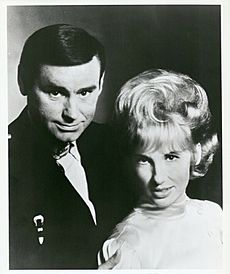
Wynette was among the country music's most commercially-successful and popular artists. She followed it with ten more singles that topped the Billboard country chart: "Singing My Song" (1969), "The Ways to Love a Man" (1969), "He Loves Me All the Way" (1970), "Run Woman Run" (1970), "Good Lovin' (Makes It Right)" (1971), "Bedtime Story" (1971), "My Man (Understands)" (1972), "'Til I Get It Right" (1972), "Kids Say the Darndest Things" (1973), and "Another Lonely Song" (1973). Most of these songs followed similar themes about housewives attempting to keep their husbands happy or the effects that troubled marriages have on children. Additionally, Epic Records released a series of studio albums by Wynette during this period. Between 1969 and 1970 alone, Epic released six original albums. This included the 1969 gospel LP, Inspiration, and the 1970 holiday LP, Christmas with Tammy. Additional album projects featured her number one and top ten singles of the period. Of these LP's, Tammy's Touch (1970) topped the Billboard country albums chart. The Ways to Love a Man (1970), The First Lady (1971) and My Man (1972) reached the Billboard country top five.
Jones and Wynette had been wanting to record together since they married. Although they started touring together in 1969, they could not record together until 1971 when Jones was released from his previous contract. Their first single was a remake of Jones's solo release, "Take Me". In 1971, it climbed to number nine on the Billboard country chart and number 12 on the RPM country chart. Their first studio LP, We Go Together (1971), reached the top five of the Billboard country albums chart. Their 1972 single, "The Ceremony", was also a top ten single in the United States and Canada. Altogether, Epic label issued seven studio albums of Jones and Wynette duets. The pair were considered among country music's most successful and well-known duet partnerships. Touring as a packaged duo, they were often referred to as the "President and First Lady". Their tour bus was labeled "Mr. and Mrs. Country Music".
However, their marriage had several challenges which made their day-to-day life difficult. The couple's marital problems prompted her to file for divorce in 1973, but the pair reconciled. Shortly afterwards, they recorded the autobiographical single, "We're Gonna Hold On". It became their first song to top the Billboard country chart. An album of the same name charted at number three on the Country LPs list. It was followed by the top ten single "We Loved It Away" in 1974. After a fight between the couple, Wynette filed for divorce again. This time however, the pair went through with it and they officially split in 1975. Despite their divorce, they were coaxed back into the studio once more to record the album Golden Ring. Its title track became the duo's second Billboard number one country single, while also reaching number five in Canada in 1976.
1976–1984: Solo return with "'Til I Can Make It on My Own" and continued success
Despite her divorce from George Jones, Wynette had to continue her career. However, she had anxiety about doing so. Fans would shout, "Where's George?" during most early performances following their split. "Even though I'd been on stage for eight years, I didn't know how to communicate with the people," she recalled. Previously a packaged act with Jones, Wynette created her own stage show for the first time. She hired the Gatlin Brothers (Larry Gatlin and his brothers Rudy and Steve) to be her road band. She also hired several women as part of her road crew. Wynette included up-tempo gospel songs to energize the audience along with slow ballads that were "extraordinarily intimate," according to writers Mary A. Bufwack and Robert K. Oermann.
In 1976, she returned to the top of American and Canadian country songs charts with "'Til I Can Make It on My Own". It was her first Billboard chart-topper as a solo artist in almost three years. The song was co-written by Wynette and reflected her life following the divorce. According to Wynette, it was her favorite song she recorded in her career. Her album of the same name reached number three on the Billboard country LPs chart. "'Til I Can Make It on My Own" was nominated for Song of the Year by the Country Music Association, while Wynette herself was nominated for Female Vocalist of the Year. Her next release, "You and Me", also topped the Billboard country chart, while a corresponding studio LP reached the country albums top five. A duet with Jones recorded the year before, "Near You", also topped the North American country charts in 1976.
Several incidents in Wynette's personal life also occurred during this period. These incidents included several short-term relationships, house burglaries, and alleged kidnappings. She also developed health problems. Yet, her commercial success continued. Although none of her solo singles topped the charts, she continued reaching the top ten. Both "(Let's Get Together) One Last Time" and "One of a Kind" reached number six on the Billboard country chart in 1977. Through 1979, Wynette had three more solo releases reach the Billboard and RPM top ten.
As the 1980s progressed, Wynette continued having commercial success but with less frequency. In 1980, she reunited with George Jones for the duet single, "Two Story House". It reached number two on the Billboard country chart and number one on the RPM country chart. However, it also proved to be her final American top five single. The pair also reunited for several shows including a performance at Wembley Stadium and an HBO special. In 1980, Wynette told Billy Sherrill that she was ready to work with a new record producer. "She needed fresh blood, fresh ideas," Sherrill commented in 2010. The final Sherrill-produced album was 1980's Only Lonely Sometimes. Both singles from the LP ("He Was There (When I Needed You)" and "Starting Over") reached number 17 on the Billboard country chart.
Several years prior, Wynette married for the fifth (and final) time to George Richey. The pair previously wrote songs together, but after marrying, he became her full-time manager. Besides business affairs, he also produced several of her albums. Following the Chips Moman-produced You Brought Me Back (1981), Richey produced Wynette's 1982 LP, Soft Touch. The album spawned "Another Chance", which became her first top ten single in several years. Additional early 1980s singles made the country top 20: "Crying in the Rain" (1981), "You Still Get to Me in My Dreams" (1982), and "A Good Night's Love" (1983). Wynette's record sales began to wane in popularity following 1982. Both the albums Good Love & Heartbreak (1982) and Even the Strong Get Lonely (1983) reached only the Billboard country top 60. Wynette's singles also reached progressively lower chart positions following 1982. This included "Still in the Ring" and a cover of John Prine's "Unwed Fathers".
1985–1998: Commercial comeback, collaborations and final years
Around 1985, Wynette made changes to her declining career. She hired California-based Stan Moress to serve as her manager. Moress had Wynette cut her hair, change her wardrobe, and incorporate choreography into her shows. Steve Buckingham also started producing Wynette's next album, which was to feature a duet. Although she wanted to collaborate with Merle Haggard, she was instead instead paired with Mark Gray. Gray had left Exile before that band's shift from pop to country, and was beginning a solo country music career of his own at the time. Their result was a cover of the pop song "Sometimes When We Touch". Wynette and Gray's rendition peaked at number six on the Billboard country chart in 1985. It became her first top ten recording in four years. The Buckingham collaboration resulted in Wynette's 1985 album of the same name, which charted at number 32 on the Billboard country LPs survey. Amidst a commercial comeback, Wynette also faced several setbacks. In 1988, Wynette and her husband declared bankruptcy following several failed investments.
Wynette's longtime label released her next album titled Higher Ground in 1987. The second Buckingham-produced project, he described it as "a more rural, more back-home" album. It featured collaborations with Emmylou Harris, Ricky Skaggs, The O'Kanes, Gene Watson, and Larry Gatlin. Bufwack and Oermann called it a "landmark LP", while AllMusic gave it a four-star rating. Despite positive reviews, Higher Ground only peaked at number 43 on the Billboard country chart. Its singles proved more commercially successful. In 1987, "Your Love" reached the American and Canadian country songs top 20, while "Talkin' to Myself Again" reached number 16 on the former. Following Higher Ground, Buckingham told Sony Music executives that it was becoming difficult to think of new album concepts for Wynette. This resulted in a temporary end to their professional partnership. Instead, she was paired with producer Norro Wilson for 1989's Next to You and Bob Montgomery for 1990's Heart Over Mind. Singles spawned from both albums reached positions outside the Billboard and RPM country top 40.
As Wynette's career entered the 1990s, several new team members were hired to manage her business affairs. This included Epic vice president Mark Martinovich who had to convince the Nashville establishment that Wynette was still marketable. Martinovich had her perform in more diverse settings, including The Bottom Line venue in Greenwich Village. Other new ventures included Wynette recording with British group the KLF. In 1991, they collaborated on the song, "Justified and Ancient (Stand by the JAMs)". KLF member Bill Drummond was a fan of Wynette's and personally called to ask her permission to record the track. Wynette accepted and Drummond helped produce it. Although she had difficulty singing in-time to the track, the song was pieced together by studio engineers when Drummond returned to England. The dance-pop song centering around an imaginary setting called "Mu Mu Land" was considered a departure from Wynette's previous recordings in terms of song choice and production. It became a chart success. By 1992, the single was being routinely played on MTV and reached number one in 18 countries.
In 1993, Wynette joined with Loretta Lynn and Dolly Parton to record the studio album Honky Tonk Angels. Parton herself explained that she wanted to make the project "before one of us goes". Consisting of classic country recordings performed in three-part harmonies, the album reunited Wynette with Steve Buckingham. Several selections on the project were penned by the trio, including one composed by Wynette herself. Honky Tonk Angels reached number six on the Billboard country albums chart and number 42 on the Billboard 200. It was Wynette's first top ten Billboard album in 18 years and her first album in 22 years to certify gold in the United States. AllMusic's Kelly McCartney called it "a fun listen" while the Songwriters Hall of Fame described it as a "landmark album".
In 1994, Wynette released a studio album of duets titled Without Walls. It featured collaborations with notable artists of the era including Melissa Etheridge, Elton John, and Sting. Its first single was a duet with Wynonna Judd titled "Girl Thang", which was among Wynette's final charting singles. Although it did not chart in North America, Without Walls did reach number eight on the ARIA charts in Australia. The project received mixed reviews. BBC called it a "respect-laden series of duets", while biographer Jimmy McDonough called it "cringe-worthy". Health problems continued to affect Wynette into the 1990s. She often missed concerts because she was too ill to perform. In the mid-1990s, Wynette was hospitalized with a severe bile duct infection that nearly led to her death. Wynette was visited by George Jones during her recovery, who encouraged her to record another album with him. The result was 1995's One. Released on MCA Records, the album reached number 12 on the Billboard country chart. It was followed by a high-profile duet tour featuring Jones and Wynette as headliners.
In 1995, Wynette was dropped by her long-time label, Epic Records. Despite this, she continued to be a popular concert attraction until her death. During this period, she re-made the Beach Boys's "In My Room" with Brian Wilson. The song proved to be her final recording. Wynette's final concerts and television performances were held in March 1998.
Other works
Other works by Wynette have also appeared outside of music. In 1979, she published a book about her life with author Joan Dew. Released by Simon & Schuster, it was titled Stand by Your Man: An Autobiography. Dew toured with Wynette in the 1970s and wrote down what Wynette told her verbatim.
Wynette's career also took shape through film and television. In 1981, CBS aired a television film about her life, also called Stand by Your Man. Directed by Jerry Jameson, the film featured Annette O'Toole as Wynette while George Jones was portrayed by Tim McIntire. Both actors did their own singing for the roles. It was reviewed unfavorably by newspaper critics. The New York Times commented, "The rags-to-riches sagas, presumably meant to be inspiring, tend to get trapped under a cloud of dreariness," wrote John O'Connor. "Suspicious viewers may legitimately conclude that the whole Tammy Wynette story has yet to be told." Richard Harrington of The Washington Post wrote, "It seems to capitalize on the creative achievement and financial success of the Loretta Lynn film bio, 'Coal Miner's Daughter.' Unfortunately, television will be television, and the results are lackluster and somewhat misleading."
In 1986, Wynette joined the cast of the CBS soap opera Capitol, playing the role of a hair stylist-turned-singer, Darlene Stankowski. It was her first major acting role. In 1987, BBC released a documentary about her life called Stand by Your Dream. A film crew followed Wynette while on the road and at home with her husband. The documentary was directed by Rosemary Bowen-Jones, who commented on it years later: "When you're someone like that, you've kind of rehearsed your life." Throughout her life, Wynette enjoyed cooking, and repeatedly cooked pinto beans on a range on her tour bus. This would inspire her to compile her 1990 cookbook Tammy Wynette's Southern Cookbook, issued by the Pelican Publishing Company. The book featured southern American-inspired recipes used routinely in Wynette's family.
In the nineties, Wynette received more exposure on television. In 1994, she guest-starred on Burt Reynolds's CBS television program Evening Shade. Fellow country artist K. T. Oslin also appeared on the show. She made a cameo on the sitcom Married... with Children in 1996. Wynette later voiced a role for the animated television show King of the Hill. She portrayed Hank Hill's mother between 1997 and 1998.
Further works about her were released posthumously. Among them were three books that appeared in the years following her death. The first was written by Wynette's daughter, Jaclyn Daly, titled Tammy Wynette: A Daughter Recalls Her Mother's Tragic Life and Death. Daly collaborated on the book with country music biographer Tom Carter. The second was written by Jimmy McDonough and titled Tammy Wynette: Tragic Country Queen. The book offered a detailed account of both Wynette's life and career told through his own words and interviews he gave of those close to Wynette. A second was published by Wynette's fourth child, Georgette Jones, and was titled The Three of Us. The book was focused on Georgette's own account of being Wynette's daughter and living her life with her father, George Jones. A limited series that will focus on Wynette and Jones's marriage began production in mid-2022. Titled George and Tammy, it features Jessica Chastain in the role of Wynette and Michael Shannon as Jones. The series is based on Georgette Jones's memoir and aired its first of 4 weekly episodes on Showtime December 4, 2022.
Death
Wynette was plagued by health problems throughout her life. Her health declined even more in the final years of her life and she began to look more frail. Wynette died on April 6, 1998, while sleeping at her Nashville, Tennessee home. She was 55 years old. Her death was certified by her doctor, Wallis Marsh, who flew from Pennsylvania to make it official. He stated in his original report that Wynette died from a blood clot in her lung.
A public memorial service, attended by about 1,500 people, was held at Nashville's Ryman Auditorium on April 9, 1998. The service was televised live by cable networks CNN and The Nashville Network. A private, graveside service had been held earlier with a crypt entombment at Nashville's Woodlawn Memorial Park Cemetery.
Personal life
First marriage
Wynette married Euple Byrd (who was five years her senior) when she was 17, one month before her high-school graduation. She originally intended to marry his brother, D.C., but the relationship ended when he remarried his first wife. Wynette was not yet of legal age so her mother would be required to sign the marriage paperwork, but she refused and instead forced her daughter to leave the family home; her grandfather signed the papers that legalized their marriage. Byrd and Wynette fought throughout their relationship. They eventually divorced in 1965. They had three daughters together.
Second marriage
Wynette met her second husband, Don Chapel, upon moving to Nashville in 1965. Chapel was a front desk attendant at the Red Anchor Motel in Nashville where Wynette was staying. The pair developed a romantic relationship through their day-to-day interactions at the motel. Chapel was also an aspiring songwriter and musician. He would later write several popular country songs, including one made commercially successful by George Jones titled "When the Grass Grows Over Me". The couple did not marry until 1967, and their courtship was brief. Her growing affection for George Jones would lead to the couple's divorce in 1968.
Third marriage to George Jones
Wynette first met George Jones while on tour with him in the late sixties. Jones was also friendly with her second husband, Don Chapel, and the three often spent time together. According to Wynette, Jones helped her one evening when one of her children was hospitalized with food poisoning. Jones and Wynette officially wed on February 16, 1969 in Ringgold, Georgia. The couple then proceeded to move into a 6,000-square-foot (560 m2) plantation home in Lakeland, Florida. They later built a performance venue on the property, which they titled "Old Plantation Music Park".
Jones and Wynette's marriage was tumultuous. Wynette filed for divorce in 1973, but the couple ultimately reconciled. By this point, they had moved to a larger home, also located in Nashville. However, their problems continued. In late 1974, Wynette filed for divorce for a second time. It was finalized on January 8, 1975. They had a daughter together.
Short-term relationships and fourth marriage
Following her divorce from George Jones, Wynette was romantically-linked to several people, until she met real estate developer Michael Tomlin through her friend Nan Crofton. It was a brief courtship, as they married only weeks after meeting. The couple wed on July 18, 1976 at her Nashville home. The marriage was annulled six weeks following their wedding.
Final marriage to George Richey
On July 6, 1978, Wynette married her fifth husband, George Richey. Richey had previously been a songwriter, music publisher, and record producer. Many of the songs Richey wrote had been recorded by George Jones, Merle Haggard, and Wynette herself. The two already had a professional relationship but a series of events in Wynette's personal life changed their relationship.
Wynette's marriage to Richey caused friction between her loved ones. According to Wynette's youngest daughter, Georgette Jones, Richey attempted to keep his wife away from her close friends. Georgette also claimed to have been estranged from her biological father (George Jones) because Richey did not want her to see him. Nonetheless, the couple remained together until her death in 1998. Richey married Dallas Cowboys cheerleader Sheila Slaughter in 2001. Richey died in 2010 at the age of 74.
Children
Wynette gave birth to four daughters. Three of her children were from her first marriage to Euple Byrd. Their first child, Gwendolyn Lee, was born on April 14, 1961. Their second, Jaclyn Faye, was born on August 21, 1962. Her third, Tina Denise, was born on March 27, 1965, which was three months early and she weighed only two pounds three ounces (990 g). Four months later, she was diagnosed with spinal meningitis and kept in isolation at a hospital for 17 days. Wynette borrowed several thousand dollars from her uncle to afford the hospital bills. Tina eventually made a full recovery. In 1975, Tina would record an album with her mother and stepfather titled George & Tammy & Tina.
In October 1970, Wynette had her fourth daughter, Tamala Georgette Jones, her only child from her relationship with George Jones. Georgette would eventually create her own music career as an adult. She has since recorded five albums and toured internationally as a country artist. Since their mother's death, Jaclyn and Georgette have worked to keep the legacy of their mother alive. Both daughters wrote memoirs about their mother following her death. The first was penned by Jaclyn Daly in 2000, titled Tammy Wynette: A Daughter Recalls Her Mother's Tragic Life and Death. Georgette would also publish a memoir of her childhood with Wynette and her father in 2011, titled The Three of Us: Growing Up with Tammy and George.
Legacy
Wynette helped bring a female's perspective to country music. Her music spoke for rural and working class women who previously lacked representation in the genre. Wynette's music also helped eliminate some of the male bias at country radio by expanding women into the record-buying public. Along with Patsy Cline, Loretta Lynn and Dolly Parton, Wynette elevated the popularity of female country artists. In total, Wynette had 39 singles reach the Billboard country chart while 20 topped the same chart. She has been said to have sold roughly 30 million records worldwide. Kurt Wolff of Country Music: The Rough Guide called her "the most successful woman country singer of the late 1960s". "Her vibrant, pleading timbre was up to the task of portraying women who have been wronged by their men, and women who are determined to stay in a relationship at any cost," he commented. Edward J. Reily of American Popular Culture Through History called Wynette "one of the most successful female country vocalists of all time."
Wynette's impact led to her being referred to by critics and fans as "The First Lady of Country Music". David Don Drehle of The Washington Post described the title in 1998: "Wynette's voice – raw, broken, sad, knowing – prophesied [...] The First Lady of Country, she came to be known for her string of hurtin' hits." Stephen Thomas Erlewine of AllMusic stated that Wynette to achieved the honorary title because she "dominated the country charts". He also commented that both her record production and modern storylines that defined her songs also helped give her the title.
Her partnership with George Jones is considered among country music's most iconic collaborations. Sara Kettler of Biography commented, "Despite many ups and downs – including two divorce filings – the pair still recorded some of the best duets in country music history." Noah Berlatsky of The Atlantic wrote, "The part-schtick, part-sincere corniness that was in different ways so integral to both of their performance styles was multiplied to extravagant levels when they sang together under [Billy] Sherrill's auspices."
Journalist Claudia Levy of The Washington Post called Wynette "one of country music's most influential singers." Her career helped influence an entire generation of female country performers, according to NPR. Faith Hill stated, "Especially with the next generation developing and creating their music, I think it's important they hear Tammy Wynette." Miranda Lambert found that Wynette's "Stand by Your Man" had a double meaning that reflected both the loyalty women have towards spouses and the strength they have as women. Kellie Pickler wanted to bring awareness of her music to a new generation by recording a track titled "Where's Tammy Wynette" for her 2012 album 100 Proof. Reba McEntire credited her as influence and later recorded a song called "Tammy Wynette Kind of Pain" for her 2019 album Stronger Than the Truth. Other artists who have cited Wynette as an influence include Garth Brooks, Suzy Bogguss, Rosanne Cash, Brandi Carlile, Terri Clark, Sheryl Crow, Sara Evans, Melissa Etheridge, Emmylou Harris, Elton John, Wynonna Judd, Martina McBride, Lorrie Morgan, Carly Pearce, Orville Peck, Taylor Swift, Pam Tillis, Shania Twain, Tanya Tucker, Carrie Underwood, Lee Ann Womack and Trisha Yearwood.
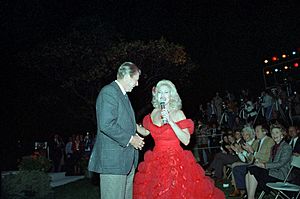
Wynette received a number of honors during her lifetime and posthumously. In 1991, Music City News gave Wynette the Living Legend Award. In 1996, she received the American Music Awards' "Award of Merit", given to artists "who have made truly exceptional contributions to the music industry". In 1993, she was inducted into the Alabama Music Hall of Fame. She also performed for several American presidents during her lifetime. This included performing for Ronald Reagan at The White House in 1983. In 1991, she performed at the Ford's Theatre for then-President George H. W. Bush.
Posthumously, Asylum Records released a tribute album called Tammy Wynette Remembered in 1998. The project featured some of Wynette's most popular songs re-recorded by contemporary artists from various musical genres. Also in 1998, she was inducted into the Country Music Hall of Fame. In 1999, "Stand by Your Man" was inducted into the Grammy Hall of Fame. The song was later added to the National Recording Registry. In 1999, Wynette was included on VH1's list of the 100 Greatest Women of Rock. In 2003, she was posthumously given the Pioneer Award from the Academy of Country Music. Country Music Television included her on its list of "40 Greatest Women of Country Music" in 2002. In 2009, Wynette's contributions as a songwriter allowed for her induction into the Nashville Songwriters Hall of Fame.
In 2010, the state of Mississippi designated a segment of Mississippi Highway 23 the Tammy Wynette Memorial Highway. The 17-mile (27 km) stretch of road is in Itawamba County, where Wynette was born. Also that year, the Country Music Hall of Fame opened an extended exhibit showcasing Wynette's life and career. Titled "Tammy Wynette: First Lady of Country Music," the exhibit ran from August 2010 to June 2011. In 2017, she was ranked number 16 on Rolling Stone's 100 Greatest Country Artists of All-Time list. In 2021, her recording of "Stand by Your Man" was ranked as No. 473 on Rolling Stone magazine's "500 Greatest Songs of All Time". Additionally, her recording of "D-I-V-O-R-C-E" placed at number 69 on Rolling Stones 2014 list of the "100 Greatest Country Songs of All Time".
Discography
|
Studio albums
|
Studio albums with George Jones
|
Filmography
| Title | Year | Role | Notes | Ref. |
|---|---|---|---|---|
| Nashville 99 | 1977 | Herself | Cameo appearance | |
| Capitol | 1986–1987 | Darlene Stankowski | ||
| Stand by Your Dream | 1987 | Herself | Documentary | |
| Evening Shade | 1994 | Jolene Eldridge | ||
| Married...with Children | 1996 | Herself | Cameo appearance | |
| King of the Hill | 1997–1998 | Tilly Hill |
Books
- Stand by Your Man: An Autobiography (with Joan Dew) (1979)
- The Tammy Wynette Southern Cookbook (1990)
See also
 In Spanish: Tammy Wynette para niños
In Spanish: Tammy Wynette para niños


